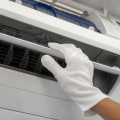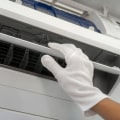The Role of 17x21x1 Filters in Keeping Your AC Running Smoothly
Wondering why you need filters of 17x21x1 measurements? This specific size fits many systems, ensuring proper airflow while minimizing clog risks. It allows HVAC systems to run efficiently, which can help lower energy costs.
Regular maintenance is vital. Changing the filter consistently helps maintain smooth operation and prevents potential damage.
Learning these factors can greatly boost HVAC performance. There is much more to learn about improving air conditioning efficiency.
Key Takeaways
Many HVAC systems accept 17x21x1 filter sizes, making replacements straightforward.
Regular filter changes boost airflow, decreasing strain on air conditioning units.
Clean filters increase energy efficiency, lowering utility costs and prolonging equipment life.
Keeping an eye on filter condition supports optimal air quality by trapping dust and allergens.
Following a steady replacement schedule avoids clogs and ensures better HVAC performance throughout the year.
Importance of Filters
Knowing several types of filters available helps in recognizing their significance. Each filter type possesses distinct capabilities for capturing harmful particles.
For example, HEPA filters can eliminate up to 99.97% of allergens, making them excellent for individuals with allergies.
Conversely, pleated filters strike a balance between filtration efficiency and airflow, making them suitable for everyday use.
Cleaning air filters maintains HVAC efficiency. Clogged ones hinder performance, resulting in poor air quality and added strain on the system.
Recognizing the importance of these leads to a healthier living space and prolongs the HVAC lifespan.
Benefits of Correct Size
Selecting 17x21x1 HVAC air filters proves beneficial due to their versatility and effectiveness. This size fits numerous HVAC systems, making it a smart choice for homeowners and businesses. Finding filters that match perfectly with your unit becomes straightforward, ensuring a hassle-free replacement process.
One key advantage is its efficiency. A larger surface area allows for capturing more particles from the air. Consequently, cleaner air fills your space, which is particularly advantageous for those suffering from allergies.
Furthermore, the compatibility of 17x21x1 filters simplifies HVAC system maintenance. Issues with improper fitting or poor airflow become less likely, reducing strain on your system.
Impacts on Efficiency of Energy
Selecting the correct HVAC air filter can greatly influence energy efficiency. A properly fitting filter enables optimal airflow, minimizing restrictions that allow the system to operate efficiently.
Additionally, filter lifespan plays a vital role. Well-maintained filters last longer, ensuring steady airflow and efficient operation. Conversely, a neglected filter may require frequent replacements, leading to higher costs and wasted energy.
Proactively selecting the right one can enhance energy efficiency and save money over time.
Maintenance and Replacement Schedule
An effective maintenance and replacement schedule for HVAC air filters ensures optimal performance. Typically, a standard 17x21x1 filter lasts about one to three months, depending on home conditions and usage. Homes with pets, allergies, or dust may require more frequent replacements.
To maintain air quality and efficiency, check filters monthly. If a filter appears dirty or clogged, replace it promptly. During the installation of a new filter, confirm the correct direction—an arrow usually indicates airflow—and ensure a snug fit in the slot. A loose filter allows air to bypass, reducing effectiveness.
Keeping a calendar or reminder system helps track replacements. Documenting each change creates a useful history of filter maintenance.
Common Myths About Filters
One common belief is that a longer filter lifespan equates to better performance. In truth, filters require regular replacement to maintain efficiency. An excessively used filter can hinder airflow, resulting in higher energy costs and possible system damage.
Another misconception involves MERV ratings, where many assume that higher ratings ensure better allergen reduction. While a higher MERV rating can capture smaller particles, it might also limit airflow if the system isn't designed for it. This restriction can strain the HVAC system, canceling out any potential benefits.
Some individuals think all air filters serve the same purpose, which is incorrect. Different filters cater to specific needs, including targeted allergen reduction.
Always consult the manufacturer's recommendations to select the appropriate filter for specific requirements.
Frequently Asked Questions
Can I Use a Different Filter Size in My HVAC System?
Using any filter size in an HVAC system is not advisable. Compatibility of filters is key for optimal performance. Incorrect sizes can lower efficiency, resulting in poorer air quality.
How Often Should I Check My Filter's Condition?
Check your air filter every month. Regular inspections keep track of when to replace the filter, ensuring your HVAC system operates efficiently. Don't neglect this vital maintenance task!
What Is the Lifespan of 17x21x1 Filters?
Generally, it falls between one and three months. Regularly check its efficiency and modify replacement timing based on dust accumulation and usage to ensure peak performance.
Are Washable Filters a Better Option Than Disposable Ones?
When comparing washable filters to disposable options, consider efficiency alongside cost. Long-term savings come with washable filters, but their ability to capture dust and allergens might fall short compared to disposables.
Do Air Filters Help Reduce Allergens?
Yes! Choosing a filter designed for optimal allergen removal is imperative for enhancing indoor air quality.
Learn more about HVAC Care from one of our HVAC solutions branches…
Filterbuy HVAC Solutions - Miami FL - Air Conditioning Service
1300 S Miami Ave Apt 4806 Miami FL 33130
(305) 306-5027


